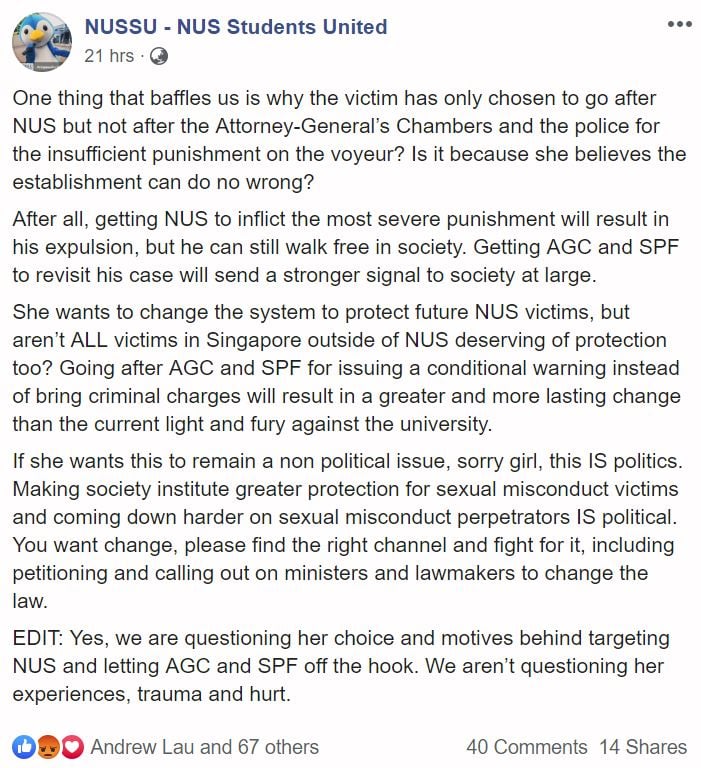Official explanation is out. Cover backside n tai chi time for the authorities.
Police warnings issued based on discretion of authorities, lawyers say
Such warnings have come under the spotlight following the case involving NUS undergraduate Monica Baey, who said she caught a fellow student filming her in the hostel shower with a mobile phone.
Singapore police-crime
File photo of a police car in Singapore.
Share this content
Bookmark
SINGAPORE: A conditional stern warning from the police may be handed to a person who has committed a minor offence for the first time, or when there is insufficient evidence, lawyers told CNA on Monday (Apr 22).
Such warnings have come under the spotlight following the case involving National University of Singapore (NUS) undergraduate Monica Baey, who revealed in a series of Instagram Stories last week that she had caught a fellow student filming her in the hostel shower with a mobile phone.
Ms Baey, who said she filed a police report after the incident last November, called on NUS to take tougher action against such offenders.
She also revealed that the perpetrator was given a 12-month conditional warning.
READ: NUS to convene review committee after undergrad calls for 'justice' against man who filmed her in shower
Offenders who are issued with a 12-month conditional stern warning do not face charges at the time, but will likely be charged if they reoffend during that period, lawyers said.
WHAT GOES INTO DECISION BEHIND CONDITIONAL WARNING
Any decision to issue a conditional stern warning is based on the discretion of the authorities, lawyers told CNA.
Mr Foo Cheow Ming, who was a Deputy Public Prosecutor under the Attorney-General’s Chambers (AGC) and now runs a private practice, said that first, the police will investigate and submit the investigation papers to the AGC.
The AGC will then assess the evidence and decide on whether to prosecute. If the AGC agrees with the police’s recommendation for a warning, the police will go ahead and do so.
In coming to a decision, the AGC will also consider representations by the lawyer of the person being investigated, he added.
While there are no boundaries as to what cases will be deemed suitable for such warnings, Mr Foo said these tend to be for smaller cases, for example, nuisance or mischief cases.
A conditional warning is usually issued for low level, first-time offenders, but is also decided on a case-by-case basis, said criminal lawyer Gloria James from Gloria James-Civetta & Co.
“Another factor that may be taken into account is the age of the offender who is still in his or her formative years. Additionally, authorities are likely to consider aggravating factors, and the merits of prosecution,” Ms James said, adding that conditional warnings are unlikely to be given to more serious offences with aggravating factors.
READ: NUS to hold town hall on sexual misconduct
Another criminal lawyer, Adrian Wee from Characterist LLC, said that warnings are typically given when there is insufficient evidence, or in cases where there is enough evidence but other factors were considered.
In some cases, police are not able to share the reasons for issuing warnings as the information may be confidential, such as medical information, said lawyer Sunil Sudheesan from Quahe Woo & Palmer LLC.
There are no laws or guidelines for when warnings should be issued, lawyers said.
WARNINGS GENERALLY EFFECTIVE, SAY LAWYERS
Individuals who have been handed a conditional warning will not have a criminal record under the Registration of Criminals Act. Records of conditional warnings are kept and maintained by the police.
Such warnings also cannot be factored in during sentencing for other offences, Ms James noted, referenced Justice See Kee Oon’s judgment earlier this year in the High Court.
“A warning, stern or conditional, has no legal effect in sentencing,” Justice See had said.
He added that a stern warning is “nothing more than an expression of the relevant authority’s opinion that the offender has committed an offence, and that if he were to subsequently engage in criminal conduct, leniency may not be shown to him and he may be prosecuted for the subsequent conduct".


